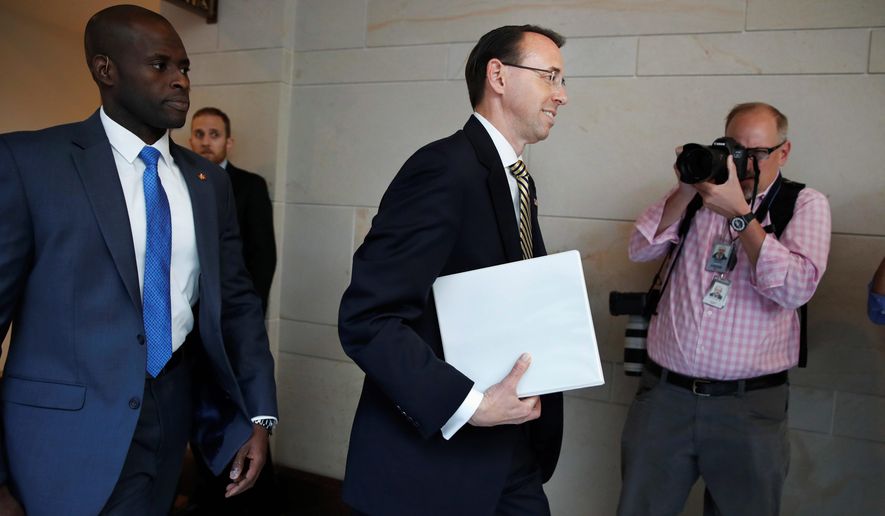The Justice Department’s look at Russian meddling in the presidential election has turned from a counterintelligence investigation into a criminal probe, leading senators said Thursday as they emerged from a secret briefing with Deputy Attorney General Rod Rosenstein.
Addressing lawmakers a day after he appointed a special counsel to head the investigation, Mr. Rosenstein also confirmed that he knew President Trump was going to fire FBI Director James B. Comey even before the president tasked the deputy attorney general with writing a memo justifying the ouster.
Mr. Rosenstein said he has given the special counsel, Robert Mueller, a former FBI director, full independence to pursue his probe and will ensure the investigation has the resources it needs as it looks into Trump campaign aides’ alleged dealings with Russian operatives.
The shift likely will feed the growing frustration of the White House. President Trump again denounced the investigation as a “witch hunt” on Thursday, a day after Mr. Mueller was tapped to head the investigation.
“The biggest legal change seems to be that Mr. Mueller is going to proceed forward with the idea of a criminal investigation versus a counterintelligence investigation,” Sen. Lindsey Graham, South Carolina Republican, told reporters after the briefing.
He suggested that Mr. Mueller’s investigators will not scrutinize only actions by Russians or other foreign actors.
Mr. Rosenstein didn’t address the press after his briefing, and inside the closed-door session he declined to get into details of the probe, but lawmakers said the direction is clear.
“Bob Mueller is doing a criminal investigation,” said Sen. Richard Blumenthal, Connecticut Democrat. “The special prosecutor is doing an investigation of criminal allegation[s] that are extremely serious, including possible obstruction of justice.”
The appointment of Mr. Mueller, who headed the FBI for 12 years, drew widespread praise in the aftermath of Mr. Trump’s abrupt dismissal of FBI Director James B. Comey last week. Mr. Comey started a Justice Department investigation in July into suspected Russian meddling and possible collusion between Mr. Trump’s campaign and the Kremlin.
Mr. Trump, who leaves on a major international trip Friday, said he was close to appointing the next FBI chief. Media reports say former Sen. Joe Lieberman of Connecticut, a Democrat turned independent, had emerged as a top candidate.
As special counsel, Mr. Mueller enjoys a high degree of independence and the powers of a U.S. attorney, which means he can subpoena records, bring criminal charges and prosecute anyone interfering in his investigation. Those charges could include intimidation of witnesses, perjury, destruction of evidence and obstruction of justice.
Mr. Graham, who chairs the Senate Judiciary subcommittee on crime and terrorism, said Mr. Rosenstein was not asked specifically if the Russia probe was now a criminal investigation. “But everything he said was that you need to treat this investigation as if it may be a criminal investigation,” he said.
Some senators expressed concern that the scope of the investigation could metastasize and plod along endlessly. But others said Mr. Rosenstein, who named the special counsel after Attorney General Jeff Sessions recused himself, described an inquiry that will largely be determined by the respected Mr. Mueller.
“He (Rosenstein) said over and over again that Mueller is going draw the scope of this investigation and Mueller is going to have the resources, and he is not to be interfered with by [Mr. Trump], or the department of justice,” Sen. Richard J. Durbin, Illinois Democrat, told reporters.
Avoiding a ’train wreck’
Part of the closed-door discussion focused on coordinating the special counsel’s probe with multiple congressional investigations of the Russia hacking charges. Sen. John Cornyn, the Texas Republican who was briefly mentioned as a possible successor to Mr. Comey, said he raised the coordination issue because the competing investigations could be”a train wreck waiting to happen.”
Mr. Cornyn added, “Clearly, Russia was very much involved in trying to undermine public confidence in our elections. I don’t think it’s in anybody’s interest to delay or impede or impair this investigation in any way.”
Although Mr. Trump has sharply criticized the special counsel decision, some Republicans on Capitol Hill say the Mueller appointment could allow Congress to focus on legislating rather than answering endless questions about the state of the investigation.
Mr. Graham explained that because it is now a criminal investigation, “Congress’ ability to conduct an investigation of all things Russia has been severely limited, probably in an appropriate fashion.”
Mr. Rosenstein was a respected U.S. attorney in Maryland when Mr. Trump nominated him to the No. 2 Justice Department post, but his role in Mr. Trump’s surprise decision to fire Mr. Comey has come in for intense scrutiny, including during Thursday’s Senate briefing.
Critics say Mr. Rosenstein appeared to do Mr. Trump’s dirty work by writing a memo critical about Mr. Comey’s handling of the Hillary Clinton email scandal, which Mr. Trump’s aides at first said was what led the president to dismiss him. Mr. Trump later said he had long planned to fire Mr. Comey for continuing to probe the Russia collusion story.
In a new wrinkle, several Democratic lawmakers said Mr. Rosenstein told the senators that he knew the president planned to dismiss Mr. Comey when he wrote the memo on May 8. Mr. Comey was fired a day later.
“He learned the president’s decision to fire him, and then he wrote his memo with his rationale,” Mr. Durbin said.
But Sen. Marco Rubio, Florida Republican, emerged from the same briefing saying that he didn’t hear enough from Mr. Rosenstein, or see all the relevant documents, to draw conclusions.
• David Sherfinski and Tom Howell Jr. contributed to this report.
• Dan Boylan can be reached at dboylan@washingtontimes.com.




Please read our comment policy before commenting.